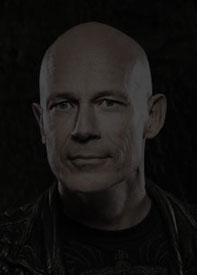|
|
On his promotion trip for the new record, Blind Rage, Wolf Hoffmann of Accept was on a busy fly-in fly-out schedule and headed to the airport right after our 30 minute conversation. Still he wasn't even the least stressed out and took the time to answer my questions in a proper manner. Questions that included the new album, tours, playing something live off the first record, the disadvantage of being a German rock musician in the early eighties, the band's return to the scene and a couple of things that just crossed my mind.
![]()
Wolf: Thanks for coming.
Tobbe: Thanks for being here.
Wolf: You bet. It's what I do.
Tobbe: You got a busy schedule?
Wolf: Oh yeah.
Tobbe: Yeah, I saw it downstairs.
Wolf: Did you see the whole list? Wasn't too bad.
 Tobbe:
Well, actually I read half of it and that was it.
Tobbe:
Well, actually I read half of it and that was it.
Wolf: But you know, you'd be surprised. Everybody's asking different questions. Every little conversion takes on a different course, so it's always fun. It's not like it's the same thing again and again and again.
Tobbe: Okay, we'll see what happens next. Let's start with the new album.
Wolf: Yes, please. That's why I'm here.
Tobbe: There will probably be a couple of questions that you've heard before.
Wolf: That's fine, that's fine.
Tobbe: The new album, Blind Rage. How does it differ itself from the two previous releases?
Wolf: You tell me. I don't think it does differ very much. Hopefully it's as good, maybe better. You know, our goal was to write just new stuff, but not to write different songs. We knew stylistically where we wanted to be, right in the pocket of where these two other albums have been. Our goal was, when you hear that first riff it should sound like 1980, but with a new sound anyway. That's what we tried to do and I think we achieved on it, at least on some of the songs.
Tobbe: Yeah, I've listened to it four times…
Wolf: You did?
Tobbe: …yes, and it's pretty much Accept, I'd say. Yes, four times, yesterday and the day before yesterday.
Wolf: Very good, very good. Do you have any songs that stick out as your favorite?
Tobbe: I like Stampede and Final Journey, you know, the last song.
Wolf: A little Greek in there for you.
Tobbe: Yes, but I've got to give it a rest now for a week.
Wolf: Sure, sure. Yeah, a lot of people seem to like Dying Breed and Dark Side Of My Heart so far, but we'll see where the trend continues.
Tobbe: Yeah, it's a couple of months until it releases.
Wolf: I mean, at the end of the day it's about the fans, what they say. I mean, I appreciate the good comments from journalists that I'm getting so far, but at the end of the day it's all about what will the fans say.
Tobbe: Yes, totally. The record is produced by Andy Sneap and he produced your two previous records as well. Naturally I understand that you're satisfied with his work, but aren't you a little worried of things turning out too similar in the end?
Wolf: We'll have to see. So far, no, and we wanted to be similar. I mean, if something is working, we shouldn't really be worrying too much about changing it. We wanna get better at songwriting, if anything. I think we shouldn't look for blame or whatever in other people or try to improve in other areas. I try to look at myself and say "You know, if I write the next hit song, it's gonna be awesome.". Andy is doing a great job, so don't change something if it's working and that's why we have the exact same team, and hopefully just a bunch of good song that will carry us very far.
Tobbe: Why did you choose to call it Blind Rage?
Wolf: 'Cause it seems to be a relevant title nowadays and you know, metal has always been about aggression and rage. You know, it just seems to fit the status of the world and it also seems to fit the artwork very well. No other reasons, really. It's not a deep meaning by any means. It just seems to be symbolizing what metal always has been about. It's never been about love and peace and, you know, Kumbaya. C'mon man, this is metal.
 Tobbe:
After your comeback with Blood Of The Nations and its successor Stalingrad,
do you feel any pressure now that Blind Rage must stand up to those two?
Tobbe:
After your comeback with Blood Of The Nations and its successor Stalingrad,
do you feel any pressure now that Blind Rage must stand up to those two?
Wolf: Yeah, but I think it will. I mean, there's always been pressure on us. First it was the pressure "Will it stand up to the past?" and then we answered that with Blood Of The Nations. Then it was like "Can you do another one like Blood Of The Nations?" and now we have the pressure of having the next one. It's a good problem to have, I'm not complaining. I think it will stand the test of time, I hope.
Tobbe: These questions will continue forever, with each record.
Wolf: Yeah probably. We have a long legacy and I think what starts to happen now, what's interesting to me, is that this new era starts to make people forget about the past a little bit all of a sudden. You know, I've heard people making a comment that they like this new era almost as good or even better than the original stuff in the eighties, which is the best of all. We're never gonna leave the past behind and start something completely fresh, because we can't, but it's a good trend that's starting to happen here. People start to see that we're for real. We're making one album after another and we're not just sort of faking it. We're really putting in the hours and the effort to make this as good as we can and to get something that's worthy and can stand up to the past songs and to the stuff from the eighties.
Tobbe: That must feel really good.
Wolf: It does. You know, when it starts to happen, and I can definitely feel something's starting to happen to that effect right now. It's starting to take a shape of its own, it's not just something that's sort of tied exactly to the old stuff. You know, at a certain point, people start concentrate more on the new albums.
Tobbe: As with the two latest albums it's very much Accept still. It sounds a lot like the eighties, but still fresh and of course your guitar play too. So when you write a riff nowadays, how do you approach it?
Wolf: Not any different than we always have, and I always have. I'm still sort of a riff kind of guy. I write riffs all day long. Some of them are stronger than others and I've never struggled with that part. I mean, I've always had plenty, a gazillion of riffs, but we spend the most amount of time on other stuff. Peter [Baltes, bass player] and I always get together first and we write the core of the songs. Say you have that first riff, but it's still a long way from that riff to a finished song, because the song is about a melodic vocal line, about a strong chorus and you gotta have a good solo part. So with all these other ingredients, a good riff is just a starting point, but that's never been a problem.
I have got riffs, and I can write riffs in a minute. The challenge is that at a certain point this will turn into a real song that people can remember. What do we call that song and what are we singing about? Which is equally as important. The song's gotta have something. It doesn't have to have a story always, but it's gotta have something that you can talk about, you know. And it better be not just something totally boring that people have heard a million times. I think, this time we actually got a lot of songs with some really cool things and that actually have some sort of meaning and you can relate to. We spent more time on the songwriting part than ever before and I'm quite, quite pleased with that, because we had the time to do it. Last time, with Stalingrad, we were so time-crunched that it was really hard. I wish that we would have had a little more time, but it turned out amazingly well. It still got a good amount of really strong songs on it.
Tobbe: To me, Stalingrad was like kind of a slow starter, but eventually it got to me. Blood Of The Nations was more like, the first time I listened to it, "Boom, this is great!". We'll see what happens with Blind Rage. Anyway, do you play all the guitars on the album?
Wolf: Yeah, I do. I always have. Since Restless And Wild I've always been the one in the studio to write all the stuff and to record all the stuff.
Tobbe: Do you feel that there's still a strong demand for Accept, a few years past the comeback?
Wolf: Oh yeah. Stronger actually, than ever. We're getting new fans as we're speaking. It's amazing. I don't know how that is and why that is, but we get younger people coming to the shows than ever, which is great. Multi generation audience. I'm not complaining, this is really good. It seems like now people are really starting to see the consistency. At first there was a lot of insecurity like "Is this gonna last? Is this gonna be any good? No, I like my old Accept, but I don't know, I don't trust it.", but now, I mean, this is the third album and something is really happening here. A trend or consistency that is really good for people to see.
 Tobbe:
I'm so fed up with people that only listen to the first four albums of
a band and then ditch everything else.
Tobbe:
I'm so fed up with people that only listen to the first four albums of
a band and then ditch everything else.
Wolf: I don't think you'll ever see us changing styles or anything. That was very good when we got back together, we didn't really know what Accept should sound like and that's where Andy Sneap was really instrumental at first. When he was sifting through the ideas with us and he made us sort of focus on this more than that. It really was very helpful, but now it seems like we're on this sort of route and we kind of really know where we belong. There wasn't any of that necessary anymore, so that's why the songwriting was really focused on only the stuff that I thought was relevant. I think Andy had sort of an easier job this time than in the beginning, because all he had to do was making sure it sounded good when we recorded. There wasn't a lot of awkward ideas that you had to leave away. You know, all the stuff that we presented to him was pretty focused.
Tobbe: And he probably listened a lot to Accept when he was younger too, I reckon.
Wolf: He did, he did. And sometimes we even disagree on like "Was this more or less Accept?", so we have a fairly strong concept of what we wanna sound like.
Tobbe: What eventually made you resurrect Accept again a few years ago? If you just give me one reason.
Wolf: Man, it was more than one reason. I can give you two.
Tobbe: Okay, give me two.
Wolf: The first, what triggered everything was the fact that we met Mark Tornillo, because you know you need a lead singer and the old one [Udo Dirkschneider] wasn't available for various reasons that I don't wanna get into.
Tobbe: I'm not gonna ask about him either.
Wolf: Thank you. But anyway, he was out of the picture, so we were left with nothing and all of a sudden there was Mark in the picture. When we found him, we thought like "Wait a minute. If there's ever a chance to make this work with another singer, with a new singer. Then he's the one.". So we had a very strong conviction. And why we wanted to be in the music business again at all, is because we like to play and the music has such a staying power. It's such a big part of our lives and we were missing it, really. I mean, I could be high and fine and happy being a photographer all day long, and I'd be okay.
But would I be more happy standing in front of a few thousand screaming kids, playing Accept songs? Heck yeah! I think the motivating factor has never been money or anything, because we'd all be better off just doing what we were doing before, if that was it, you know. But it's really satisfaction and purpose in life, if you want. I mean, there isn't many things you can do to get that sort of reward, playing these live shows and making albums, like we are doing now. I realized what a staying power all this stuff had. You know, it's never gonna go away. I can't think of anything else I could do in life that has that sort of legacy. You know, when you're a photographer, stuff gets thrown away tomorrow. Nobody cares about pictures.
Tobbe: Yes, I know. Music stays.
Wolf: Music stays. I mean, who would have thought that we'd still play songs that we wrote 35 years ago, or 30 years.
Tobbe: Yes, it's incredible when you think of it. I remember when I was a young kid, like 10, and listened to Accept.
Wolf: Yeah, and here we are, still playing and still talking about Restless And Wild and Balls To The Wall. Imagine that. Crazy.
Tobbe: In this day and age, with things out on the internet. What kind of sales figures do you expect?
Wolf: I have no idea. I don't worry about it so much. I mean, of course you always wish it was millions. We were just talking about it over lunch today. Can you imagine back in the eighties a band like…Skid Row's…or somebody's first album sold like 8 million albums. This stuff just doesn't happen anymore, ever. Surely not in the rock world. You know, like Guns N' Roses and Bon Jovi, they sold millions and millions and granted, we did okay back then, but nowadays everybody's happy to sell a hundred thousand albums world wide. That's the sad truth. You know, we're doing okay, I'm not complaining, but it's not about that anymore. In a weird way, it's got its good sides too.
I mean, everybody's complaining, and I'm starting to become one of them, that all the downloading took all those record sales away, but it also took away that immense pressure, because there were other bands selling 8 millions and "Why aren't you selling 8 million records?", you know what I mean. So we now at least don't have that pressure anymore. We can do our thing and nobody's talking about hits and radio hits anymore. Thank God, those days are over. Now it's all about having a solid album, solid success, but nobody's expecting that MTV hit anymore. Hallelujah! Because that was nasty, because you would always be compared and back in the day it was considered a failure if you didn't sell. "Oh, they only sold like 3 million albums. It's lousy". Imagine that.
Tobbe: Tough times. When looking at record releases, Accept wasn't active during the internet boom. What was it like to enter this age with Blood Of The Nations?
Wolf: It was weird, man. That was a new, changed world. We made some mistakes early on, releasing some demos. We thought "Everybody's gonna be so happy.". Oh no, not a good idea. But it's a changed world, yeah. You know, the old rules don't work anymore. You have to adapt pretty quick and nobody really knew what to expect when we made the decision and announced to the world what we were gonna do. Pretty much it was like jumping off a cliff, blindfolded, not knowing where you're gonna land and how hard you're gonna hit or is it gonna be a soft landing or what is gonna happen here. Are we gonna crash or what?
We just sort of hoped for the best. You know, you make some adjustments along the way, but overall it's been so positive reactions. Much better than anybody could have ever hoped for. I mean, who could have thought, 3 albums down the road and a few world tours going well. But then, if you don't try, I mean, if you don't dare, you don't win. People always say "Wasn't it a big risk to do all that?". Well yeah, but what do you have to lose?
Tobbe: When Accept was on hiatus, or even non-existent; where there times when you didn't play any guitar at all?
Wolf: Yeah, there were. Sometimes I didn't touch a guitar for a whole year.
Tobbe: That's a long time.
Wolf: I know it is, but I always did that. I've never been a guy who sort of practices all the time. It kept me quite refreshing too, to put it aside for a while. I was a little rusty at first, so I had to actually get in shape again.
Tobbe: How will you tour to support the album?
Wolf: We'll start in September. We're gonna do some shows in the States initially and then we're gonna come to Europe with our own headlining tour and play everywhere. Germany, Scandinavia, lots of shows in Scandinavia actually. And all the way to Japan and Australia too. First time ever in Australia.
Tobbe: How tough will it be to create a setlist that will please fans of both your new stuff and your older material?
Wolf: It will be hard, but it's hard every time that we have to do that. To tell you the truth, it's a luxury problem to have, because we have so many songs. It's not so much; What do we take in?. It's really; What do we take out, when we take a new one in? Obviously you have to throw some out and somebody's always gonna complain about "Why don't you play my favorite song?".
Tobbe: Or play a five hour set?
Wolf: I mean, two hours is pretty much the max, because you usually have an opening act and they have to play too, and curfews, and promoters start to complain if you play too long, and singers can't sing forever. Did you ever notice that the shows get longer and longer and longer? In the eighties a typical show was like 75 minutes or 80 minutes and now it's like two hours is sort of a standard almost, isn't it?
Tobbe: Almost. Would you dare playing just a few of the classics live and totally base your sets on material from the three latest records?
Wolf: I think fans wouldn't like that if we did. As much as I would like to, I think it would disappoint enough fans to where it wouldn't be worth it. Not everybody is familiar with the new stuff as much as you are. But like I said earlier, I see that something is starting to happen here with us. The new three albums start to separate from the old stuff so much that we actually could go into that direction one day. I'm not saying we're quite there yet, but more and more people are telling me that they like these last three albums as much, if not more, than some of the classic old stuff. There might be a day and time somewhere, where this new era overtakes the old legacy period, but not any time soon maybe. I don't know, we'll see.
Tobbe: It's hard to break the spells. What would it take for you to play a couple of songs from your first album?
Wolf: Aah. What would it take? I don't know. Some convincing, I guess. What would it be, first of all?
 Tobbe:
I don't know. Seawinds maybe? [I just mentioned the first song that crossed
my mind.]
Tobbe:
I don't know. Seawinds maybe? [I just mentioned the first song that crossed
my mind.]
Wolf: Seawinds. I don't know about that. Sounds Of War could be as good, maybe it's not quite so bad. Some of the first songs were pretty obscure, I have to admit. Lady Lou. What were we thinking?
Tobbe: How old were you on the first album?
Wolf: 17. I was a kid, man. I had no clue. Not that I have a clue now, but I surely didn't have a clue then.
Tobbe: Do you believe that you personally would have gotten more recognition as a guitar player back in the day if you were born British or American?
Wolf: Most definitely. It was definitely a disadvantage to be out of Germany. We always felt that. Especially back then when we got our first start. Nobody came out of Germany but the Scorpions and it was always the big Scorpions ahead of us. I mean, they were so much more approachable, much more successful radio friendly music. For us it was definitely always an extra burden to be from Germany. British bands and the American bands seemed to have a certain advantage, because there was no question where metal or rock came from, but nobody came from Germany. "What are you trying to do?". You know what I mean? It just didn't happen. Even the bands, our heroes, they were all from America, or mostly Britain actually. I think we were mostly influenced by British bands ourselves and everybody was from Britain for a while. I mean Judas Priest, Deep Purple and all the bands that influenced other. They all came out of England, and of course some American acts as well. But those two places and nothing in between. Nobody really ever listened to any French rock or whatever.
Tobbe: I still don't listen to any French rock.
Wolf: If it exists? I don't know. I think it does, I'm sure it does.
Tobbe: So when you record the new albums, how much do you benefit from today's technology?
Wolf: Oh man. More than ever. I mean, of course it's all digital recording.
Tobbe: Well, you have to do it that way.
Wolf: Yeah, we have to do it. For a split second when we initially wanted to get back, there were some discussions whether we were gonna do it totally old school to tape, and Sneap would have been on board with that, but we changed our minds after we did the demos with him and we saw what we could do now, and what we couldn't do on tape, especially in the songwriting process when you're still forming the songs. I think tape recording totally works if you've got a well rehearsed band that knows exactly what they wanna do and you just wanna capture it somehow, the magic of playing live together, and don't wanna do a shitload of other work with it. Then it's totally cool. But we weren't that band. We were still sort of fishing and digital recording is definitely the way to go. We've come a long way since, you know, I'm working in my own studio all the time and we use modern technology, definitely. Left and right, wherever we can.
Tobbe: Yes, look at those devices. [Pointing at our iPhones.] It's like carrying a computer all the time.
Wolf: Yeah, totally. To me, it amazes me that, even during the mixing period, if there's something I don't like about anything in the process, I can go and sit in my studio, play another lick and it can appear in the finished product in like ten minutes while Andy is sitting in England mixing. He just sends me a demo mix and I try something new and I'll send it back to him and he flies it into the session and there it is. Boom! No traveling, no nothing. I mean, it's quite amazing what you can do.
Tobbe: It gets less expensive too.
Wolf: Yeah. Even the software gets so much better and better, it's mind-blowing. I'll give you another example. When we did our last demos in the nineties, it was all with this arcade digital first drum computer, I think it was. The SR-16, still used today actually. It was so limited and sounded so crappy. It sounded like a tin box machine. It gave you a hint of what the drums would sound like, but not more. And nowadays they have drum software that's called EZ Drummer. Man, it's so mind-blowing. I mean, it's like the real deal almost, still almost, but for songwriting it's certainly incredible.
 Tobbe:
So do you think that there will be a time when people stop playing guitar
and program everything through a computer?
Tobbe:
So do you think that there will be a time when people stop playing guitar
and program everything through a computer?
Wolf: Guitars is gonna be tough, but you know, drums is already there. A lot of people are doing that. Guitars with all these little nuances is gonna be tough and singing is obviously gonna be tough too, but who knows what's all gonna be developed. But one thing will always be the same; A good song is a good song, no matter how you end up recording it. Man, all that new technology doesn't help you if the idea isn't good. I've always said that "You can't kill a good song.". You can record it in the crappiest way you ever wanted. It's still gonna be a success. And the other way around. You can't polish a turd. If it's crap, it's crap. No matter how good you record it. If it doesn't grab you, it doesn't grab you. Technology might sparkle it up a little bit, but it's not gonna change the core fact that it's not a good song and that principle has always been true for all these years and it will always be the same.
Tobbe: And finally. Will Accept still be active in 10 years?
Wolf: Good chance. Most definitely, I'd say. If it's up to me alone, I'd say definitely yeah. But things aren't up to me ever alone. It's like a team thing, but I think we've got a very good chance.
Tobbe: Well, it still sounds fresh though.
Wolf: I think so. I mean, most of these other guys that are still around are more than 10 years older than we are. So if they can do it, why couldn't we? Why shouldn't we?
Tobbe: Maybe some of them should have called it quits a couple of years ago?
Wolf: I don't think anybody's ever gonna call it quits, unless something's gonna happen. Their health is gonna start failing. I mean, what else are they gonna do in life, all these guys, that are still out there doing it? Look at AC/DC. Why would they still be on tour if they didn't like it? They certainly don't need the money. What would they do? Just stay at home and mow the lawn? No. You go out, play shows in front of 50000 kids and have a lot of fun doing it. I mean, money is never gonna be the motivating factor. Not for us certainly. I mean, we're not even anywhere close to that league anyhow, but even for us it's a huge rush that we usually don't ever get. That's why we still do it and I can't imagine us quitting that any time soon, or ever, if I can help it. As long as we can crawl on stage, we'll be there.
Tobbe: Okay, thank you very much.
Wolf: Good talking to you.
![]() See
also: review of the
album Blind Rage
See
also: review of the
album Blind Rage
Related links:
www.acceptworldwide.com
www.facebook.com/accepttheband